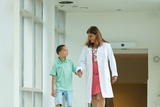Cardiovascular Connective Tissue Disorders Clinic

Our Cardiovascular Connective Tissue Disorders Clinic at Children's Hospital of Philadelphia (CHOP) provides family-centered care for children with connective tissue disorders involving the aorta and blood vessels of the body. We specialize in the diagnosis and treatment of conditions that lead to the development and enlargement (increased size) of aneurysms.
Our clinic offers both cardiac and genetic expertise. We provide imaging and medical treatment, as well as surgery if necessary. Our genetic counselor coordinates testing, ongoing support and connection with additional specialties as needed.
How we serve you
Our clinic is one of few programs of its kind to provide care in clinic from both cardiology and genetics experts. Because many children with connective tissue disorder also have other related medical conditions, we partner with multiple specialties across CHOP to meet your child's unique needs.
Conditions we treat
- Bicuspid aortic valve
- Congenital heart disease associated with enlargement of the aorta
- Enlargement of the aorta for unknown reasons
- Specific forms of Ehlers-Danlos syndrome
- Familial thoracic aortic aneurysm and dissection (FTAAD) syndrome
- Loeys-Dietz syndrome
- Marfan syndrome
- Specific forms of Ehlers-Danlos syndrome
-
Turner syndrome

Why choose us
We take a personalized, team approach to your child's care. In addition to medical and surgical expertise, we offer a unique Lifestyle Medicine Program to support your child's long-term health.

Meet your team
Your child will be cared for by one of the most accomplished teams of pediatric experts in the world. We make sure your child gets the highest level of care and support.
Your donation changes lives
Every donation helps us make lifesaving breakthroughs for children everywhere.
